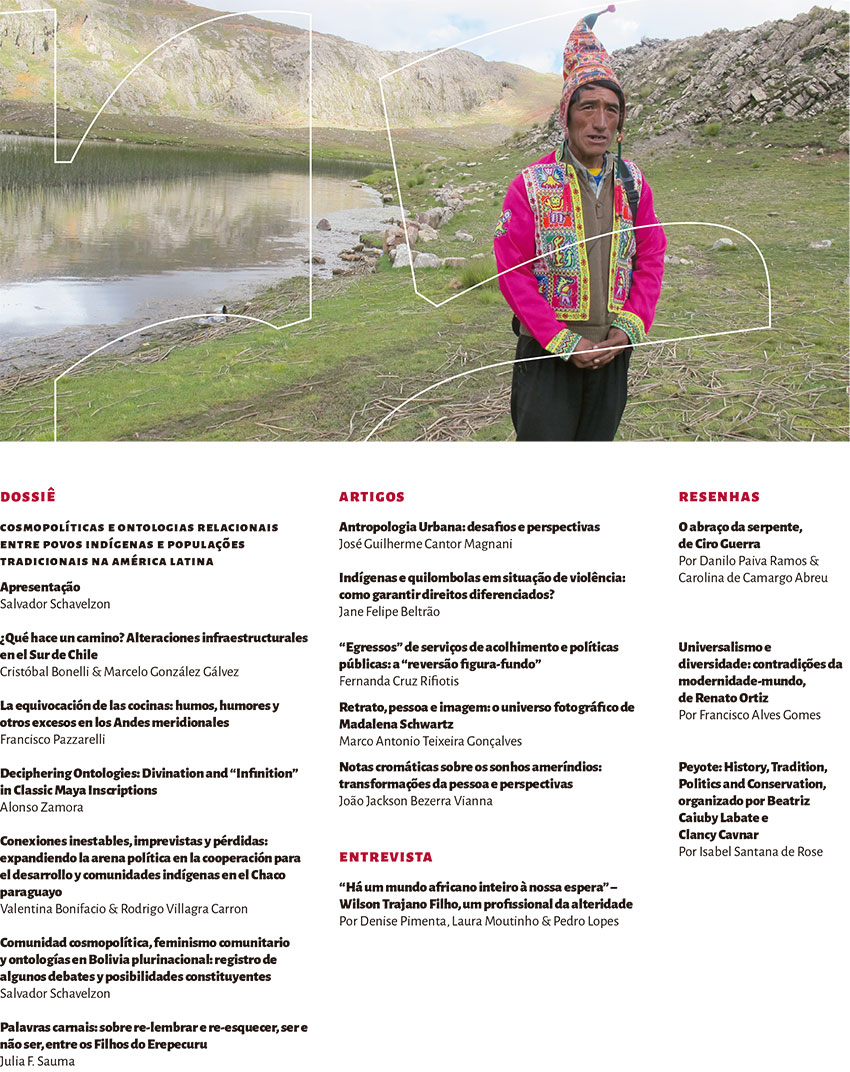Carnal Words: About Re-Remembering and Re-Forgetting, Being and Not Being, among the Sons of Erepecuru
DOI:
https://doi.org/10.11606/2179-0892.ra.2016.124811Keywords:
Remnants of Quilombos, Ontology, Forgetfulness, Words, BodyAbstract
In this work, I explore the analytical potential of what Martin Holbraad calls ‘ontographic method’, based on the reflections of the Sons of Erepecuru about the process of remembering and forgetting reports about their ancestors, and the performance of these words on the body. The first step is a consideration of the importance that the Sons confer to the forgetfulness of their reports about the arrival of the ancients to the river Erepecuru, in the city of Oriximiná, state of Pará. From this ethnographic question, I describe how the need to forget and the care inherent to the act of remembering are related to the power of words to mobilize forces and feelings, healings and diseases, into the person. Such ethnographic reflection makes it possible to suggest how language and experience are related by the Sons of the Erepecuru, and how this relationship operates on the basis of a mobile ontologyDownloads
References
ALEXANDER, Jeffrey et al. 2004. Cultural Trauma and Collective Identity. Los Angeles, University of California Press.
CAMPOS, Augusto; CAMPOS, Haroldo; e PIGNATARI, Décio. 1956. “Manifesto Concretista”. ad, arquitetura e decoração, n. 20.
DELEUZE, Gilles e GUATTARI, Félix. 1997 [1980]. Mil platôs: capitalismo e esquizofrenia. São Paulo, Editora 34.
ECO, Umberto e MIGIEL, Marilyn. 1988. “An Ars Oblivionalis? Forget It!”. pmla, vol. 103, n. 3: 254-261.
EYERMAN, Ron. 2001. Cultural Trauma: Slavery and the Formation of African American Identity. Cambridge, Cambridge University Press.
GILROY, Paul. 1993. The Black Atlantic: Modernity and Double Consciousness. Cambridge, ma, University of Harvard Press.
GOLDMAN, Marcio. 2011. “Cavalo dos Deuses: Roger Bastide e as transformações das religiões de matriz africana no Brasil”. Revista de Antropologia, vol. 54, n. 1: 407-432.
GOW, Peter. 2001. An Amazonian Myth and its History. Oxford, Oxford University Press.
HOLBRAAD, Martin. 2014. “Truth Beyond Doubt: Ifá Oracles in Havana”. hau, Journal of Ethnographic Theory, vol. 2, n. 1: 81-109.
HOLBRAAD, Martin. 2012 Truth in Motion The Recursive Anthropology of Cuban Divination. Chicago e Londres, University of Chicago Press.
LIMA, Joaquim. 1992. História dos negros que através da luta conseguiram libertar-se dos senhores de escravos. Pará, 12 dat.
MACEDO, Valéria e SZTUTMAN, Renato. 2014. “A parte de que se é parte. Notas sobre individuação e divinização (a partir dos Guarani)”. Cadernos de Campo, n. 23: 287-302.
O’DWYER, Eliane. 2002. “Os Quilombos do Trombetas e do Erepecuru-Cuminá”. In (org.). Quilombos: identidade étnica e territorialidade. Rio de Janeiro, Editora fgv, pp. 255-280.
OVERING, Joanna. 1989. “Styles of manhood: an Amazonian contrast in tranquility and violence”. In HOWELL, S. e WILLIS, R. (orgs.), Societies at Peace. Londres, Tavistock Publications, pp 79-99.
RAMO Y AFFONSO, Ana. No prelo “O que nos levanta sobre a terra: alegria e saudade fazendo parentesco”. In GALLOIS, Dominique e MACEDO, Valéria (orgs.), Nas redes guarani. Um encontro de saberes, traduções e transformações.
SAUMA, Julia. 2013 The Deep and the Erepecuru: Tracing Transgressions in an Amazonian Quilombola Territory. Londres, tese, University College London.
SAUMA, Julia. 2014 “Entrosar-se, uma reflexão etnográfica afroindígena”. Cadernos de Campo, n. 23: 257-270.
SAUMA, Julia. 2015 “Consenso unânime: movimentos pela tranquilidade e a sobreposição de pensamentos entre os Coletivos-Quilombolas de Oriximiná”. In GRUPIONI, d. F. e DE ANDRADE, L. M. M. (orgs.), Entre águas bravas e mansas: índios e quilombolas em Oriximiná. São Paulo, Comissão Pró-Índio e Iepé, pp. 234-251.
SCOTT, David. 1991. “The Event, This Memory: Notes on the Anthropology of African Diasporas in the New World”. Diaspora: A Journal of Transnational Studies, v. 1: 261-284.
SMELSER, Neil. 2004. “Psychological Trauma and Cultural Trauma”. In ALEXANDER et al. (orgs.) Cultural Trauma and Collective Identity. Los Angeles, University of California Press.
SZTUTMAN, Renato. No prelo “O desabrochar da palavra: sobre o encontros dos Clastres com os Guarani”. In GALLOIS, Dominique e MACEDO, Valéria (orgs), Nas redes guarani. Um encontro de saberes, traduções e transformações.
VANZOLINI, Marina. 2014. “Daquilo que não se sabe bem o que é: a indeterminação como poder nos mundos afroindígenas”. Cadernos de Campo, n. 23: 271-285.
VIEIRA, Suzane. 2015 Resistência e pirraça na malhada: cosmopolíticas quilombolas no Alto Sertão de Caetité. Rio de Janeiro, tese, ufrj.
VIVEIROS DE CASTRO, Eduardo. 2006. “A floresta de cristal: notas sobre a ontologia dos espíritos amazônicos”. Cadernos de Campo, n. 14/15: 319-338.
VIVEIROS DE CASTRO, Eduardo; PEDERSEN, Morten; e HOLBRAAD, Martin. 2014. “The Politics of Ontology: Anthropological Positions”. Fieldsights- Theorizing the Contemporary, Cultural Anthropology Online.
Downloads
Published
Issue
Section
License
Copyright (c) 2016 Revista de Antropologia

This work is licensed under a Creative Commons Attribution 4.0 International License.
Authors who intend to publish in this journal must agree with the following terms:
- a) Authors retain copyright and grant the journal the right of first publication. The work is simultaneously licensed under the Creative Commons Attribution License, which allows the work to be shared as long as the author and the initial publication in this journal are appropriately credited.
- b) Authors are authorized to sign additional contracts for non-exclusive distribution of the version of the work published in this journal (e.g., to publish it as a book chapter), as long as the author and the initial publication in this journal are appropriately credited.
- c) Authors are allowed and encouraged to publish and distribute their work online (e.g. on their personal webpage) after the editorial process, for this can generate productive changes as well as increase the impact and citation of the work. See The Effect of Open Access Publications.




